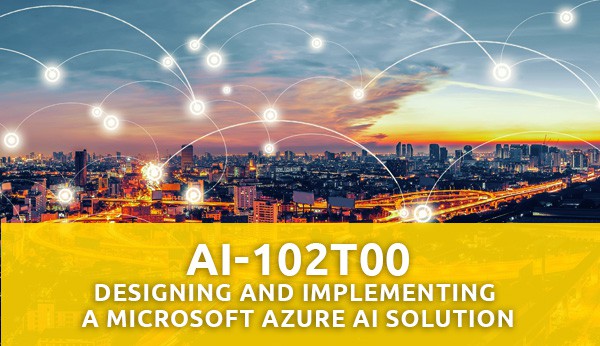
Module 1: Introduction to AI and AI on Azure
Lessons:
- Introduction to AI
- AI in Azure
- Getting Started with Azure AI Services
- Using Azure AI Services for enterprise applications
Module 2: Develop computer vision solutions with Azure AI Vision
Lessons:
- Analyze and manipulate images
- Create a custom vision model
- Detect and recognize faces
- Analyze videos
Module 3: Develop natural language processing solutions
Lessons:
- Analyzing and translating text
- Build a question answering solution
- Build a conversational language understanding app
- Custom classification and named entity extraction
- Speech recognition, synthesis, and translation
Module 4: Develop Generative AI Solutions with Azure OpenAI Service
Lessons:
- Get started with Azure OpenAI Service
- Develop apps with Azure OpenAI Service
- Apply prompt engineering with Azure OpenAI Service
- Use your own data with Azure OpenAI Service
Module 5: Creating a knowledge Mining Solution
Lessons:
- Implementing an Intelligent Search Solution
- Developing Custom Skills for an Enrichment Pipeline
- Creating a knowledge store
Module 6: Develop solutions with Azure AI Document Intelligence
Lessons:
- Use prebuilt Document Intelligence models
- Train a custom Document Intelligence model
Microsoft Azure AI engineers build, manage, and deploy AI solutions that make the most of Azure Cognitive Services and Azure services. Their responsibilities include participating in all phases of AI solutions development—from requirements definition and design to development, deployment, integration, maintenance, performance tuning, and monitoring.
These professionals work with solution architects to translate their vision and with data scientists, data engineers, IoT specialists, infrastructure administrators, and other software developers to build complete end-to-end AI solutions.
Azure AI engineers have experience developing solutions that use languages such as Python or C# and should be able to use REST-based APIs and software development kits (SDKs) to build secure image processing, video processing, natural language processing (NLP), knowledge mining, and conversational AI solutions on Azure. They should be familiar with all methods of implementing AI solutions. Plus, they Exam AI-102: Designing and Implementing a Microsoft Azure AI Solution 3 understand the components that make up the Azure AI portfolio and the available data storage options. Azure AI engineers also need to understand and be able to apply responsible AI principles.
Before attending this course, students must have:
- Knowledge of Microsoft Azure and ability to navigate the Azure portal
- Knowledge of either C# or Python
- Familiarity with JSON and REST programming semantics
To gain C# or Python skills, complete the free Take your first steps with C# (https://learn.microsoft.com/en-us/training/paths/csharp-first-steps/) or Take your first steps with Python (https://learn.microsoft.com/en-us/training/paths/python-first-steps/) learning path before attending the course.
If you are new to artificial intelligence, and want an overview of AI capabilities on Azure, consider completing the Azure AI Fundamentals certification (https://learn.microsoft.com/en-us/certifications/azure-ai-fundamentals) before taking this one.


